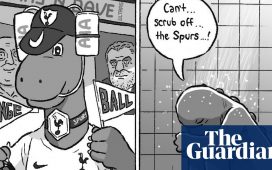Sport is often dismissed as mere entertainment, but it is where some of the most serious matters play out, from geopolitical relations to international PR. So it’s apt that sport would turn out to be the rock upon which the now long-running arguments about gender should finally crash open.
Two weeks ago Martina Navratilova, one of the greatest athletes of all time, leaped into the notoriously feverish gender debate and wrote that self-identified trans women should not have an automatic right to compete in women’s sports because they have unfair advantages from having been born male. The media, terrified of being on the wrong side of history, responded predictably, and headlines said that Navratilova was “criticised over ‘cheating’ trans women comments”, although this criticism came largely from a relatively unknown cyclist, Rachel McKinnon, with a history of incendiary remarks (such as that lesbians such as Navratilova should “get over their genital hang-ups” when it comes to choosing sexual partners). When Navratilova published a further blog last weekend, firmly restating her position, the headlines again suggested wrongdoing on her part, such as the BBC’s “Navratilova sorry for transgender ‘cheat’ language as she re-enters debate”.
What got notably less media attention was the support for Navratilova from other elite athletes, including Chris Evert, Billie Jean King, Sally Gunnell, Paula Radcliffe, Kelly Holmes and Nicola Adams. Arguments about gender are now so vicious that most high-profile people would rather eat their hair than speak out. But sport, it turns out, is a more clear-cut issue to some than, say, prisons – where various groups have argued over whether trans women should be housed with female inmates.
The current ideology is that gender identity is at least as important, if not more so, than biological sex. That is why an LGBT sports group like Athlete Ally can dismiss Navratilova’s arguments about male skeletal advantages with a simple “trans women are women”. The International Olympic Committee allows trans women to compete if they have been reducing their testosterone for 12 months; but, increasingly, female athletes are saying that testosterone is not the only advantage. Boys start growing bigger bones, muscles and greater heart capacity from puberty, and no gender switch will undo that. One can firmly defend a person’s right to live in the gender identity of their choosing yet also look at photos of trans women athletes such as Gabrielle Ludwig, Natalie van Gogh and McKinnon standing alongside their strikingly smaller female team-mates, and think Navratilova’s arguments are worth investigating instead of dismissing with cries of bigotry.
Even some of those who argue that trans women should compete against other women know the latter would be at a disadvantage. But to them, this is the price of equality. One columnist wrote last week that if transgender athletes did dominate women’s sport to the exclusion of biological females “would that be that bad? In a way it would be inspiring.” One can only wonder if this columnist would be quite so blase about an entire sex missing out on sports careers, scholarships and medals if that sex was his own. Strikingly, no one explains why, if biology doesn’t matter, no male athletes are worried about trans men competing against them. Instead, women’s objections were dismissed as “feverish hysteria”, as if bigotry was a natural female trait.
Feminists and the LGBT movement are usually allies, and yet they have become antagonists on this issue – and if there’s one person in this country who has, at the very least, exacerbated this, it’s Maria Miller. In 2017, as chair of the women and equalities committee, Miller produced a report on transgender rights in which she recommended that changing gender should be through a process of “self-declaration” rather than after consultation with a doctor.
Single-sex spaces (such as sport and prisons), which exist because of the significant physical differences between male and female bodies, would become single-gender ones. But if – as the transgender movement rightly argues – sex and gender are two separate things, why should single sex suddenly mean single gender? Miller insisted that the only objections came from “women purporting to be feminists” , and maybe she believed what she was saying. Maybe she was trying to improve her right-on cred after having previously tried to cut the abortion time limits Whichever, for the next two years, discussions of gender became mired in metaphysical arguments about what is and isn’t a woman. This culminated with the Lib Dem MP Layla Moran arguing she could tell what someone’s sex is, not by their physical body, but by “looking in their soul”.
Miller set off a savage culture war in which the losers were women, trans and not, all of whom felt unfairly attacked; and they were all correct. Biological women felt like they were being told to engage in magical thinking, deny their lived experience and accept the irrelevancy of biology, while trans women felt like they were being asked to defend their identity. None of this would have been as vicious if Miller hadn’t framed the debate so badly.
And Miller herself admits this, kinda. In January she said the government (ie, she) “mishandled” trans rights by focusing on what constitutes a woman. Since then, there has been a sense that the centre ground is being regained, with more open acknowledgements that gender matters, but so does biology. Last week the while sportswomen spoke up, SNP politician Joan McAlpine said there would not be a third option to the biological sex question on Scotland’s 2021 census because “sex and identity are not the same thing. Biological sex is an important demographic variable needed to record and plan services.”
It was revealed last weekend that Downview prison in south London will be the first in Europe to have a unit for trans prisoners, in response to “significant concern” among the female prisoners about the arrival of male-bodied inmates. And it may well be that, one day, trans athletes will have their own category too. Because, contrary to anyone’s breezily dogmatic platitudes, this is not a black-and-white issue. The greys are still taking shape.
• Hadley Freeman is a Guardian columnist and features writer













